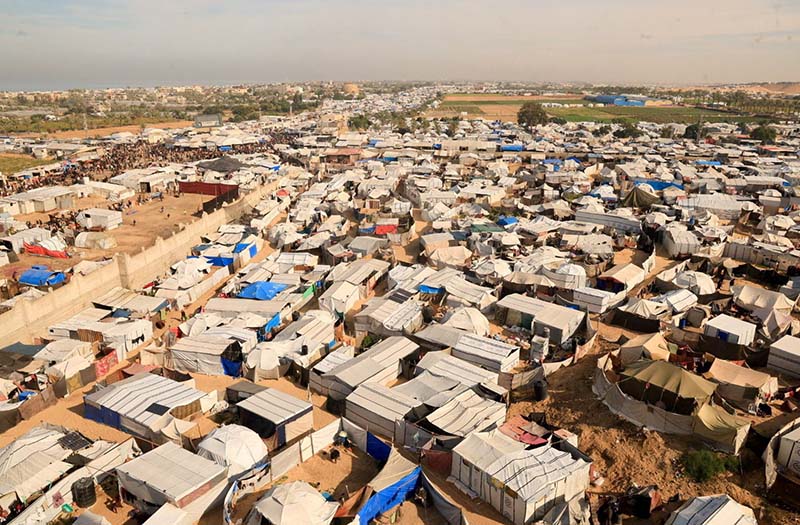(OSV News) — The United Nations’ move to approve President Donald Trump’s plan to end the Israel-Hamas war in the Gaza Strip has evoked both hope and doubt for Catholic leaders in the U.S. and the Holy Land.
On Nov. 17, the U.N. Security Council voted 13-0 in favor of the U.S.-backed “Comprehensive Plan to End the Gaza Conflict,” with Russia and China abstaining.
The plan would install transitional governance and military forces in war-ravaged Gaza.
“I am encouraged by the U.N. Security Council’s approval of the United States’ peace plan to end the devastating war in Gaza,” said Bishop A. Elias Zaidan of the Maronite Eparchy of Our Lady of Lebanon of Los Angeles, which is based in St. Louis.
Bishop Zaidan, who chairs the U.S. Conference of Catholic Bishops’ international justice and peace committee, said the “gesture sends a powerful message that the international community is serious about peace in the Holy Land.”
‘A security perimeter presence’
The vote greenlighted a resolution supporting Trump’s 20-point plan for Gaza, which calls for establishing a temporary Board of Peace as well as an International Stabilization Force in Gaza under the board’s governance.
The resolution text also specifies the gradual withdrawal of Israel’s military from Gaza as the stabilization force provides control.
However, “a security perimeter presence … will remain until Gaza is properly secure from any resurgent terror threat,” said the U.N. in a Nov. 17 press release on its website.
The U.N. also said in its release that the board will remain authorized until Dec. 31, 2027, “subject to further Council action.”
Additionally, the release said the U.N. Security Council “underscored the importance of the full resumption of humanitarian aid into the Gaza Strip in cooperation with the Board, in a manner consistent with relevant international legal principles, through cooperating organizations — including the United Nations — and ensuring such aid is not diverted by armed groups.”
Concern plan not sufficiently explicit
Despite the approval, several nations nonetheless expressed concern during U.N. discussions that the plan was insufficiently explicit and did not sufficiently specify a two-state solution to the conflict.
Catholic experts in Israel told OSV News they shared those concerns.
Joseph Hazboun, regional director for the Catholic Near East Welfare Association-Pontifical Mission’s Jerusalem office, said he was “not sure” how the plan “will be implemented on the ground.”
He said that “almost a month and a half have passed since the ceasefire”; however “no real progress has been made except for the cessation of daily massive bombing.”
At the same time, “targeting Gazans by the Israelis continue … borders are closed … supplies are not controlled or sufficient,” said Hazboun, adding there was “no horizon for rehabilitation” or “reconstruction.”
Hazboun added, “I doubt the plan will work.”
Sami El-Yousef, CEO of the Latin Patriarchate of Jerusalem, said he was “happy that there appears to be some consensus to provide relief to our people in Gaza and to offer some hope for a lasting peace.”
However, he said, “this resolution follows multiple resolutions on the Palestine-Israel issues that are all sitting on some shelf gathering dust!”
El-Yousef asked, “Will it be different this time? Is there a true will on all sides to resolve this decades-old conflict and reach the aspired peace and justice and life in dignity for all in the Holy Land, or is this a show-off that will join all previous resolutions?”
During the U.N. discussions, Denmark’s representative said the plan was “our best opportunity to bring about lasting peace” with an eye to such a solution, while Panama’s representative cautioned that “the perfect is the enemy of the good,” stressing the plan was a “first necessary step” toward strengthening the ceasefire, ensuring humanitarian aid and reconstructing Gaza.
“I reiterate our call for prayers for peace, as well as for a multilateral effort to provide humanitarian relief to the people of Gaza,” said Bishop Zaidan.
Weeks after second anniversary of war
The U.N. Security Council resolution comes weeks after the second anniversary of the Israel-Hamas war, which began on Oct. 7, 2023, when Hamas forces invaded Israel, killing some 1,200 Israelis and abducting 251 hostages. To date, more than 69,000 Palestinians have been killed in the conflict, according to the Hamas-run Gaza health ministry.
Under the Trump-brokered ceasefire deal, Hamas has now returned the remaining living hostages to Israel, and all but three of the bodies of 28 deceased hostages. Israel has returned 250 Palestinian prisoners and more than 1,700 Gaza detainees.
Gina Christian is a multimedia reporter for OSV News. Follow her on X @GinaJesseReina.
Updated Nov. 20, 2025 at 12:50 p.m. CST




